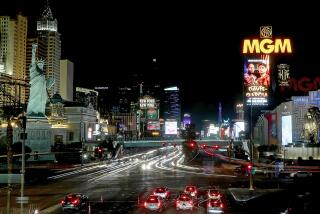Hotels hop on the ‘green’ bandwagon
In case you haven’t noticed, hotels are going green, doing their part to be ecologically friendly. You might call it the Al Gore effect, although the movement began before “An Inconvenient Truth” won an Academy Award this year.
The green efforts go further than asking guests to use towels and bed linens more than once (as they do at home), to conserve water and avoid flushing more detergent-laden water into sewers. It’s also more than replacing incandescent light bulbs with compact fluorescent bulbs in guest rooms.
Other green initiatives are subtler -- things a guest might never notice: recycling, low-flow faucets and showerheads, water-saving toilets and the use of products that don’t harm the environment or contribute to global warming.
Whether guests truly care about these hotel efforts is another matter. When you call a hotel to make a reservation, what are you most concerned about -- the room rate and hotel’s location, or its conservation efforts? The only green at issue is dollar cost.
Some 59 percent of frequent travelers admit to letting their “green routines” slip when on the road, according to a survey commissioned by the new Element extended-stay brand of Westin Hotels, part of Starwood Hotels & Resorts. Conducted by StudyLogic, a New York research firm, via telephone interviews with 1,041 respondents who had a minimum of three hotel stays over the last 12 months, the survey of frequent travelers found:
70 percent open a new mini-bottle of shampoo and conditioner each time they shower on the road.
75 percent expect fresh sheets and towels daily in a hotel, but not at home.
60 percent are more likely to leave a bathroom light on overnight in an unfamiliar hotel room than at home.
63 percent are more likely to leave a light on when they leave a hotel room than at home.
62 percent said one reason they use water and energy less efficiently in a hotel than at home is that they “don’t have to pay for it.”
According to Starwood, when Westin’s first Element Hotel opens in Lexington, Mass., next year, shampoo dispensers will eliminate multiple plastic mini-bottles; water-saving devices will conserve an estimated 4,358 gallons of water per room each year; compact fluorescent light (CFL) bulbs will cut energy use by 75 percent, and eco-friendly materials will be used throughout the hotel.
As responsible corporate entities, Starwood and other hotel companies believe they must slash waste and pollution because it makes both sound economic and public relations sense. While many hotel groups have green policies in place, Hyatt, Ritz-Carlton and others are ramping up their eco-initiatives. In time the whole industry will have to be green to be competitive.
Kimpton Hotels, a boutique group of 42 properties, launched an EarthCare program about four years ago. The mission is “to deliver a premium guest experience through non-intrusive, high quality, eco-friendly products and services.” Translation: Use recycled paper and soy-based inks, recycle paper and other materials in hotels, install water-saving faucets, showerheads and toilets, use energy-saving lighting.
In Chicago’s Monaco Hotel, a Kimpton property, most of these conservation efforts are in place. Some, guests will notice; others occur behind the scenes. “We serve organic coffee and tea in our lobby during the morning, and in all our restaurants and meeting rooms,” Nabil Moubayed, Monaco’s general manager, said. “We have low-flow aerators in our faucets and low-flow showerheads. Cards explain linen-changing and towel re-use options, and there’s a tasteful, maroon recycling bin in each room.”
What Moubayed and Kimpton are still searching for is an appealing fluorescent light bulb for guest room lamps.
As an added green bonus, some Kimpton hotels have a free or discounted parking incentive for guests who drive hybrids, a program that the Monaco will have in place later this summer.
Here’s what else, unusual and usual, is happening on the green front:
Four Seasons. During its high season, the tony Four Seasons Jackson Hole (Wyo.) is replacing 7,000 plastic bottles of water left when beds are turned down in the evening with pitchers of local tap water. At the Four Seasons Boston, in a trial test with the firm Pure Allergy Solutions, five rooms were made allergy-friendly to help guests who suffer from airborne allergies. Four Seasons Maui recently had its oceanside hales (huts) renovated by the island’s only hale builder, who uses no nails or screws, only natural materials.
Hilton Hotels. Individual hotel efforts include allergy-resistant rooms and improved indoor air quality at the Hilton Chicago O’Hare Airport, Conrad Miami and Doubletree Hotel Tucson. The Hilton New York completed the rigging of a Pure Cell 200, a state-of-the-art fuel-efficient power- and hot water-generating system as part of its global green program. Hilton’s bed linen and towel initiative saves more than 12 million gallons of freshwater a day. Several years ago, Hilton switched from incandescent to compact fluorescent lighting in guest rooms, reducing the wattage used per room by 70 percent, yet making the rooms brighter.
InterContinental Group. At InterContinental Chicago, specific green practices include a motion detection system that conserves lighting and air-conditioning energy when guest rooms aren’t occupied; a towel and sheet re-use program (changes are made every three days unless a guest requests otherwise), and water-saving devices in faucets, showers and toilets. Table scraps and leftover food go to composting sites. The InterContinental Group recently launched an initiative to replace more than 250,000 incandescent light bulbs with CFLs in more than 200 company-managed hotels in the Americas.
Marriott. With more than 2,800 lodging properties in the U.S. and abroad, Marriott said last year’s eco-efforts reduced greenhouse gases by 70,000 tons, and its goal to reduce emissions by nearly a million tons between 2000 and 2010 is the equivalent of taking 140,000 cars off the road. Also, last year Marriott saved 65 percent on hotel lighting costs by replacing 450,000 bulbs with fluorescent lighting.
Wyndham Hotels. Pure Room technology, which sanitizes every surface and fabric, and purifies air and water to provide maximum guest comfort, now is in place at three Wyndham properties -- Lisle-Chicago, Miami Airport and Peachtree in Atlanta. Individualized climate controls and CO2 sensors also are being installed. Wyndham’s other green initiatives: energy-efficient room lighting, water conservation, recycling, the use of materials with recycled content and solar heating where possible.
Comments? Email travel-feedback@latimes.com
More to Read
Sign up for The Wild
We’ll help you find the best places to hike, bike and run, as well as the perfect silent spots for meditation and yoga.
You may occasionally receive promotional content from the Los Angeles Times.






